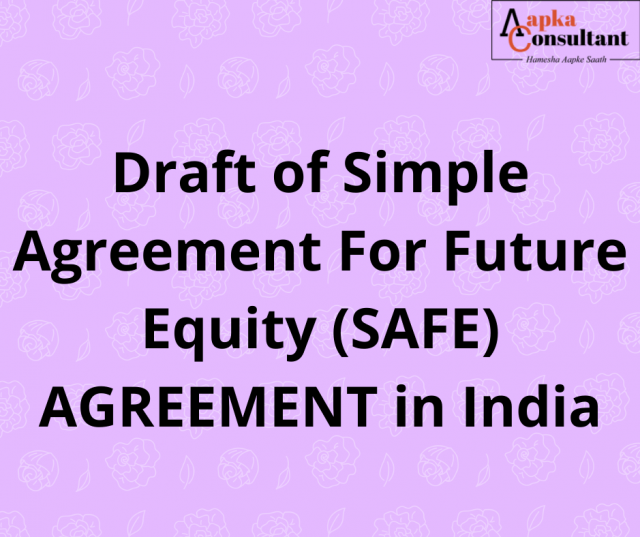“Secure your Funding in Indian Startups through SAFE Agreement”
Introduction
Simple Agreement for Future Equity (SAFE) is a relatively new funding mechanism gaining popularity in the Indian Startup Arena. It has not been around that entire long, and many investors do not fully understand what it is yet. There are benefits and risks associated with investing in SAFES. We believe SAFEs can be a potentially transformative tool for startups, certain investors, and the ecosystem as a whole.
What is a SAFE?
A Simple Agreement for Future Equity (SAFE) is a custom equity-based financing instrument. It allows a founder to attract capital when they are most in need. In 2013, Y Combinator developed this term in response to the urgent need by startups to raise funds quickly while retaining ownership of some of their company’s future upside.
How SAFE play its Role
By entering into a SAFE, you will invest a certain amount of money and receive shares in the future as long as the triggering event occurs. This option gives your company immediate funding in order for them to get up and running, without having to determine a share price, making it easier for them to get off the ground. There is no way for an investor to know whether their investment will be successful, so make sure you think about your financial situation before you invest.
Crucial Clauses in SAFE
- Discounts- As a SAFE investor, you are entitled to some % discount say for , 10% or 20% if you wish to purchase shares in the next round of equity financing. However, if you choose to sell your SAFE without exercising it, the amount due will be calculated at the higher share price.
- Valuation Caps- A valuation cap protects you from losing value due to dilution. The valuation cap also limits the price that you will pay for your shares. You don’t have to worry about some future, higher priced round further reducing your ownership of the company.
- Most Favoured Nations (MFN) Provision- This term is applied when more than one SAFE option is being offered to investors. If you have invested in a SAFE and the company raises another, they are required to inform you of the terms for the following SAFE. If you think the new SAFE has better terms than the one you are currently holding, you have an opportunity to request the same terms.
- Pro-rata Allotment- When you negotiate pro-rata rights as a part of your SAFE, you can invest extra funds into the company at the time of the triggering event to maintain your percentage of your ownership in the company. This is a great way to take advantage of incentives put in place by other investors, while also maintaining the percentage of ownership that you negotiated.
Rationale behind SAFE
- Many early-stage companies are not yet ready to raise capital from angel investors, VC firms, and other investors. For these companies, a seed SAFE makes sense since it allows the company to raise funds from its family and friends.
- It lets you raise money before your company is ready for an investment round. This flexible product allows you to raise more capital, earlier in the development process while giving your shareholders liquidity if they need it.
- Startups and investors mutually benefit when the startup is able to raise money just enough to suggest that it has great potential, but not so much that the company immediately becomes worth a lot more than what you were hoping to invest. This helps ensure that you get some form of a return on your investment, even if the startup ends up becoming a bit less valuable than you had hoped. You need to keep in mind that you are risking your entire investment, however, since many startups never make it to an IPO (and sometimes they do go bankrupt).
- Entrepreneurs can change their business model. They can build into their idea various product lines and services. They can enter or exit categories as they choose, control distribution channels, enhance or undercut competitors – all without your permission or consent. This is a negative to you as an investor. You have no say in the decisions that may affect the eventual value of your stake in the company.
Conclusion
SAFEs provide you with the opportunity to invest in a company before it goes public. As an angel investor, using this investment vehicle allows you to get involved in more opportunities and provides a way to diversify your portfolio while supporting companies that are cutting-edge technology. Learn more about the risks and benefits of SAFEs prior to investing.
If you want to Secure your Funding in a Startup, the Professionals of Aapka Consultant will help you to Draft your SAFE.
You can approach the team of Aapkaconsultant by clicking here.












